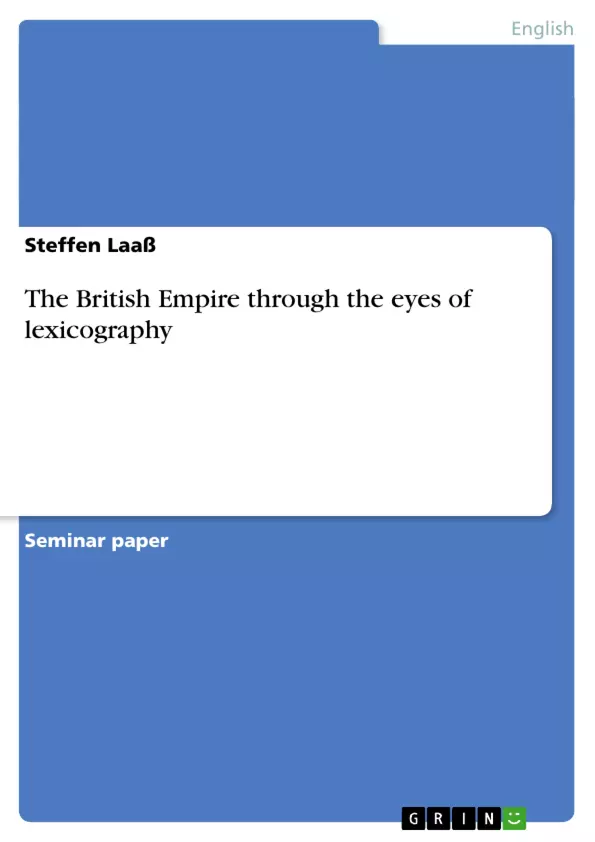This paper is the attempt to combine the fascinating fields of cultural studies and linguistics with the following question in mind: How do contemporary monolingual English dictionaries deal with and define terms such as colony, colonialism, empire and imperialism? – concepts that we inevitably associate with the British Empire.
Thousands of books and articles have been written on Britain’s colonial past. Therefore, it is not my design to discover something unexplored or to present new theories but to scrutinise the way lexicographers handle ‘imperial’ vocabulary. To this end, a number of dictionary entries had been analysed for their wording and accessibility. It should be noted that this paper was written on the basis of predominantly general, non-technical references, hoping to make different lines of thinking easier.
Inhaltsverzeichnis (Table of Contents)
- Introduction
- The calm before the storm
- What is an empire
- The colony
- Colonialism
- From colonialism to imperialism
- Concluding remarks
Zielsetzung und Themenschwerpunkte (Objectives and Key Themes)
This paper explores how contemporary monolingual English dictionaries define terms related to the British Empire, such as "colony," "colonialism," "empire," and "imperialism." It examines lexicographic practices and their accessibility by analyzing dictionary entries for these terms. The focus is on general, non-technical dictionaries and aims to provide an accessible understanding of the subject.
- Lexicographic treatment of terms related to the British Empire
- Historical context of the British Empire's rise
- Evolution of the term "empire" and its contemporary usage
- Definition and characteristics of colonies
- Transition from colonialism to imperialism
Zusammenfassung der Kapitel (Chapter Summaries)
- Introduction: This chapter introduces the paper's aim, which is to examine how English dictionaries define terms associated with the British Empire. It emphasizes the analysis of lexicographic practices and the use of general, non-technical dictionaries.
- The calm before the storm: This chapter explores the historical context leading up to the establishment of the British Empire, highlighting the lack of anticipation for its rise and the prevailing attitude toward empires at the time.
- What is an empire: This chapter focuses on the definition of "empire" by analyzing dictionary entries from various sources. It examines different perspectives on what constitutes an empire, considering factors such as the number of countries controlled, the extent of territory, and the role of a sovereign ruler.
- The colony: This chapter delves into the concept of a colony, exploring different definitions and examining the relationship between colonies and empires. It also discusses the role of profit and subjugation in colonial expansion.
Schlüsselwörter (Keywords)
The central keywords and concepts of this paper are: British Empire, lexicography, colony, colonialism, empire, imperialism, dictionary entries, cultural studies, linguistics, historical context.
Frequently Asked Questions
How do English dictionaries define "colonialism" and "imperialism"?
This paper analyzes how contemporary monolingual dictionaries handle these terms, scrutinizing their wording and accessibility for general readers.
What is the difference between a colony and an empire in lexicography?
The study explores various dictionary definitions to understand the relationship between colonies (territories) and the overarching structure of an empire.
Why is the historical context of the British Empire relevant to linguistics?
The rise of the British Empire shaped the English language; lexicographers must decide how to define historical concepts that carry significant cultural weight.
Are dictionary definitions of "empire" always the same?
No, different dictionaries emphasize different factors, such as the number of countries controlled, the extent of territory, or the role of a sovereign ruler.
What role does profit play in the definition of a colony?
Many definitions link the concept of a colony to economic expansion, profit, and the subjugation of territories for the benefit of the mother country.
- Quote paper
- Steffen Laaß (Author), 2003, The British Empire through the eyes of lexicography, Munich, GRIN Verlag, https://www.grin.com/document/114247



